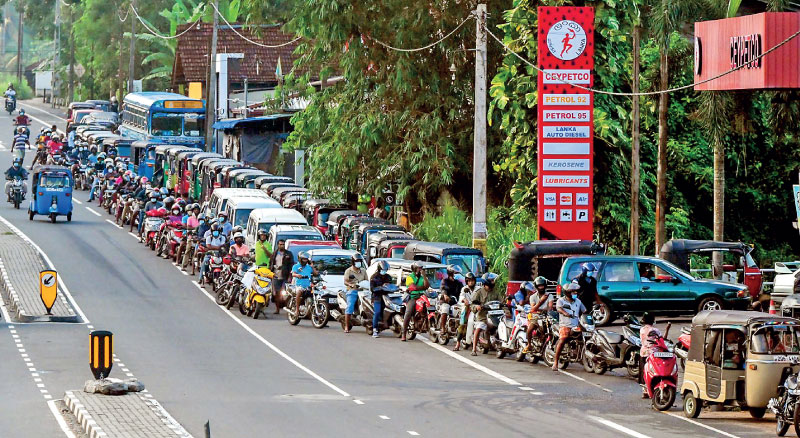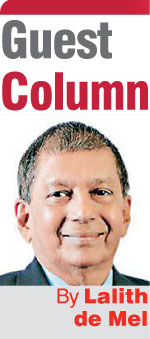Friday Feb 20, 2026
Friday Feb 20, 2026
Friday, 23 September 2022 02:45 - - {{hitsCtrl.values.hits}}

The crisis was upon us like a sudden large shower
 If we fail to tell the people the whole truth, the continuing problems can snowball into an explosion of violent dissent all over the country. The sad truth is that whoever is President, whoever is Prime Minister and whoever is in the cabinet, cannot wave a wand and solve our economic problems overnight. Regardless of who has the reins of power it will be a long hard journey ahead.
If we fail to tell the people the whole truth, the continuing problems can snowball into an explosion of violent dissent all over the country. The sad truth is that whoever is President, whoever is Prime Minister and whoever is in the cabinet, cannot wave a wand and solve our economic problems overnight. Regardless of who has the reins of power it will be a long hard journey ahead.
The truth
There is nothing complex about what is the truth about our problems.
We have two problems. A desperate shortage of rupee funds available to the Government. The Government revenue from taxes and other sources is well below the Government’s requirement of funds. The other problem is we need foreign exchange and we do not have the foreign exchange we need. We need it for a number of things that impact our lives. We need it to import all the fuel we require, diesel, petrol, kerosene, and we need it to import gas. We also need foreign exchange to import some essential food items. We also need it to get fertiliser to grow our essential food items. We need it for diesel for the fishing boats that provide us with fish. We need it to get essential medicines.
We importantly require foreign exchange to support the activities that generate foreign exchange like the raw materials for industries that export and the essential inputs for tourism.
The challenge
It is quite straightforward and clear. We don’t earn enough foreign exchange to import all the essential things that have to be imported. What we need is a government that has the skills to judiciously allocate the limited foreign exchange to optimise the benefits from the limited foreign exchange. It is not an easy task. The difficult part is to manage the tensions between current needs and the need to nurture the activities that bring in foreign exchange. For instance in a period of dire shortages of essential food and medicines people on tea estates may react strongly to fertiliser being bought and used on the estate. There will be many such tensions. With the many needs for FE vigorously canvassing their case for priority.
It is similar to rupees. Running the printing press and creating money is not a solution. It will create inflation and prices of goods and services will rise and this will lead to agitation and unrest. As with foreign exchange we need a government that will judiciously ration the available rupees and prune the budgets for expenditure.
We do not have a national consciousness of the many complex issues that confront us and the hard road to address them. A large part of this is due to the selfish interests of the many political parties. Their greed to come into power blinds them and they cannot see the need to come forward and pull together to solve our problems. Their yearning to come to power and the means of getting there is the only motivation that makes them get up in the morning.
The antidote to this is a strong leadership that will have a continuous dialogue with the people to create an understanding of the issues and the way they are being addressed.
Debt is the dark cloud
We are burdened with debt. We have long-term debt and short-term debt arising from issuing bonds that have to be redeemed on specified days. We have to renegotiate this long-term debt with those that have provided these loans, and have to find the means to redeem the short-term debt. The only option is help from the IMF and it is good news that the IMF has made an offer of assistance. However all IMF funds come with requirements designed to restructure the economy to reduce the risks in the future. Until the IMF funds became available the only option we had was to go with the begging bowl to friendly countries. That was the parlous state of the country. Getting our debt into some kind of manageable scenario is a key challenge to those governing the country.
We need people with the knowledge and experience to face up to these difficult issues. Those with a GCE and experience as a disruptive trade unionist or a loud mouthed politician as the only work experience will neither understand, or be able to address these issues. Therefore keeping them out of power becomes an important priority in the process of regenerating our economy.
Why did it happen?
Our problems are primarily due to Mahinda Rajapaksa’s mega infrastructure projects. All of them had no payback in rupees or foreign exchange in the foreseeable future and left the country with the need to pay back in foreign exchange the debt and the interest until the debts have been repaid. It was abundantly obvious at the time that we did not have an inflow of foreign exchange to meet these commitments. Why did he do it? Was he just plain stupid? If not, what was the motivation? Only he can answer and until then many will believe that he received a nice present from the Chinese, for giving them the projects and taking the loans from them to pay for the projects.
If he wants to clear his name he could publish all his declarations of assets from the first time he became Prime Minister and give an open letter to all banks abroad to submit details of any deposits with them to the Governor of the Central Bank.
Why was it a sudden crisis?
The crisis was upon us like a sudden large shower. The public had been given no inkling of the serious lack of foreign exchange and the gravity of the consequences. It was a shock when we had no petrol, diesel, kerosene, and gas, and many other essentials. Until then we had all the imported goodies, chocolates, whisky and wine, etc.
We have not seen any explanation from the then Prime Minister Mahinda Rajapaksa about why he said nothing and did nothing about an impending crisis. Prof. W.D. Lakshman was in the same “said nothing club” and so was Nivard Cabraal. He was like a deputy finance minister until he crept back into being Governor of the Central Bank with a cabinet minister status. He actually aggravated the situation by redeeming (without deferring) a government bond at par, when we were desperately short of foreign exchange. Dr. P.B. Jayasundera, a very experienced economist who had been secretary to the President, said nothing and did nothing.
It seemed as if there was a concerted effort to critically undermine the regime of President Rajapaksa. Intended or not that is what happened.